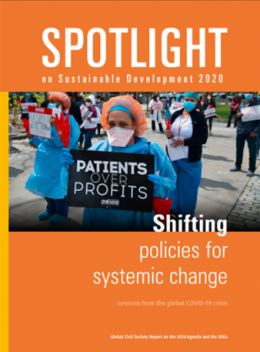Lessons from the global COVID-19 crisis
This is the fifth edition of the report Spotlight on Sustainable Development. Since 2016, we have published this report annually to assess not only the implementation of the 2030 Agenda but also the structural obstacles in its realization.
When we started to plan for this year’s report in Autumn 2019, mass protests were shaking a growing number of countries in various regions of the world. In Ecuador, Brazil, Chile and Argentina, in Egypt, Lebanon, and in India, millions of people took to the streets to demonstrate against the prevailing policies.
The triggers were often transit fare increases, cuts in public services and other strict austerity policy measures, which in each country placed a particular burden on the poor and middle classes, particularly women. While the global debt crisis is real, such policies were applied even in countries where fiscal space had not reached a limit and before less damaging options -such as taxing the rich- had been exhausted. Thus, the Spotlight Report 2020 originally aimed to draw attention to the looming global economic and financial crisis, its possible consequences for the achievement of the SDGs and the resulting political consequences.
And then came the outbreak of the COVID-19 pandemic with its devastating effects in all parts of the world. Of course, we had to react to it in our report. But at the same time, it is important for us to point out that the global spread of the virus and its damages are not independent of “pre-existing conditions” of environmental destruction, climate change, erosion of public services and other symptoms of “maldevelopment”. The economic downturns following the lockdown are due to have dramatic effects.
Thus, the Spotlight Report 2020 aims to unpack the various features and amplifiers of the COVID-19 emergency and its interlinkages with other crises, including the economic lockdown, increased job loss, hunger and homelessness, increased disparities of opportunity, wealth and power both within and among countries, increasing instances of racial and gender violence, discrimination of all those perceived as “different” and escalating climate disasters.
The report consists of three parts: The first, based on national civil society reports, describes how COVID-19 and resulting lockdown has affected countries in different ways, depending on their social and economic circumstances. It also highlights examples of civil society responses to these crises and the various forms of social mobilization for transformational change.
The second part describes briefly how governments and international organizations have responded to the economic and health crises resulting from the COVID-19 pandemic. They have put together economic stimulus packages and recovery programmes totalling more than US$ 11 trillion. But do these measures address the structural causes of the crises? Who benefits from them - and who does not? Do they systematically take human rights and sustainable development into account? Has the decades-long imposition of austerity policies been halted or will these policies be restored when governments have to pay the bill for the recovery measures?
The third part of the report argues that policy responses to COVID-19 must not repeat the mistakes of the past and lead to the old ‘normal,’ or business as usual. The call to “build back better" became a leitmotif of intergovernmental responses to the crisis. But does “building back” really lead to the urgently needed systemic change? What kind of policies, strategies and structural changes are necessary to ensure the primacy of human rights, gender justice and sustainability goals in all policy areas? The chapter highlights eight key areas in which not only policy and governance reforms but also changes in the underlying narrative are long overdue. The World Economic Forum has launched its “Great Reset” initiative to rescue capitalism. We offer as an alternative our “8 R”-agenda for transformational recovery.
This and previous Spotlight reports are supported by a broad range of global civil society organizations and trade unions. They are also informed by the experiences and reports of national and regional groups and coalitions from all parts of the world. The contributions cover many aspects of the 2030 Agenda and the SDGs (and beyond) and reflect the rich geographic and cultural diversity of their authors.
But what all contributions have in common is their fundamental critique of underlying social and economic structures, power relations and governance arrangements. Thus, meaningfully tackling the obstacles and contradictions in the implementation of the 2030 Agenda and its SDGs requires more holistic and more sweeping shifts in how and where power is vested and exercised, including through institutional, legal, social, economic and political commitments to realizing human rights.
The main message is that the multiple crises can only be overcome if the massive power asymmetries within and between societies can be reduced.
Barbara Adams and Jens Martens, Global Policy Forum (GPF)
Roberto Bissio, Social Watch
David Boys, Public Services International (PSI)
Chee Yoke Ling, Third World Network (TWN)
Kate Donald, Center for Economic and Social Rights (CESR)
Stefano Prato, Society for International Development (SID)
Ziad Abdel Samad, Arab NGO Network for Development (ANND)
Gita Sen and Maria Graciela Cuervo, Development Alternatives with Women for a New Era (DAWN)
Shifting policies for systemic change
Spotlight on Sustainable Development 2020
Global Civil Society Report on the 2030 Agenda and the SDGs
Shifting policies for systemic change - Lessons from the global COVID-19 crisis
Published by Social Watch, Third World Network, Global Policy Forum, Arab NGO Network for Development, Development Alternatives with Women for a New Era, Society for International Development, Public Servies International, Center for Economic and Social Rights with support from Friedrich-Ebert-Stiftung.
Beirut/Bonn/Ferney-Voltaire/Montevideo/New York/Penang/Rome/Suva, September 2020
ISBN 978-3-943126-50-1

